第一部分选修7Unit 4Sharing
- 格式:doc
- 大小:623.00 KB
- 文档页数:16
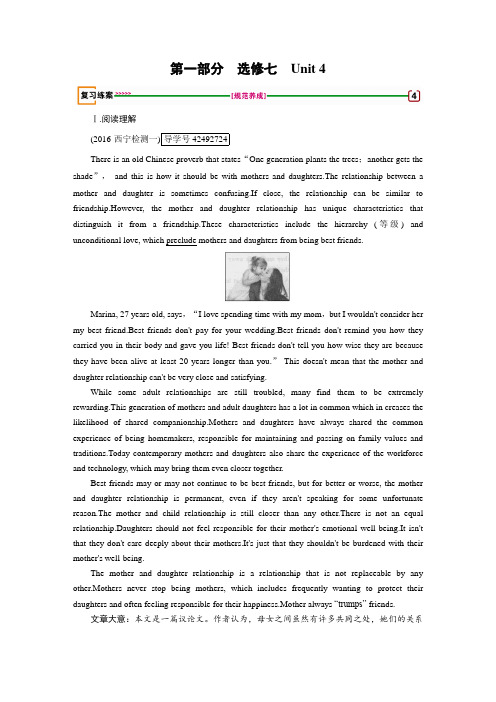
第一部分选修七Unit 4Ⅰ.阅读理解(2016·西宁检测一)导学号 42492724There is an old Chinese proverb that states“One generation plants the trees;another gets the shade”,and this is how it should be with mothers and daughters.The relationship between a mother and daughter is sometimes confusing.If close, the relationship can be similar to friendship.However, the mother and daughter relationship has unique characteristics that distinguish it from a friendship.These characteristics include the hierarchy (等级) and unconditional love, which preclude mothers and daughters from being best friends.Marina, 27 years old, says,“I love spending time with my mom,but I wouldn't consider her my best friend.Best friends don't pay for your wedding.Best friends don't remind you how they carried you in their body and gave you life! Best friends don't tell you how wise they are because they have been alive at least 20 years longer than you.” This doesn't mean that the mother and daughter relationship can't be very close and satisfying.While some adult relationships are still troubled, many find them to be extremely rewarding.This generation of mothers and adult daughters has a lot in common which in creases the likelihood of shared companionship.Mothers and daughters have always shared the common experience of being homemakers, responsible for maintaining and passing on family values and traditions.Today contemporary mothers and daughters also share the experience of the workforce and technology, which may bring them even closer together.Best friends may or may not continue to be best friends, but for better or worse, the mother and daughter relationship is permanent, even if they aren't speaking for some unfortunate reason.The mother and child relationship is still closer than any other.There is not an equal relationship.Daughters should not feel responsible for their mother's emotional well-being.It isn't that they don't care deeply about their mothers.It's just that they shouldn't be burdened with their mother's well-being.The mother and daughter relationship is a relationship that is not replaceable by any other.Mothers never stop being mothers, which includes frequently wanting to protect their daughters and often feeling responsible for their happiness.Mother always “trumps” friends.文章大意:本文是一篇议论文。

高中英语学习材料madeofjingetiejiUnit Four Sharing课程标准中的内容标准:本单元的话题是Sharing,主要涉及帮助弱者、志愿服务、合作分享等,使学生了解世界上很多地方依然很落后,从而懂得同情,学会分享。
同时学生可了解一些志愿者工作的信息,培养学生互助合作的精神和社会责任感。
教学细目:1、(情感目标)帮助学生理解志愿者工作的意义,培养学生在日常生活中帮助他人、扶贫救困的爱心,增强学生的团队合作精神与分享意识。
2、(交际)通过听说学习学会用与时间相关的表达讲述一个人的经历和如何用目标语言表清逻辑关系。
3、(词汇)通过阅读、师生互动掌握本单元的教学目的和要求中的词汇。
4、(写作)通过阅读及听说,学习人物介绍的写法和用语。
5、(语法)通过书面训练,深入理解和进一步运用限制性定语从句。
学习领域与主题内容及要求目标层次人教版选修七UnitFourSharing理解掌握运用1.1.1. 话题:Helping others; voluntary work √1.1.2功能句式:Time sequences and logical relationsWhy would you...?The reason is that…Because I want to share with others ...How could you do that?First, find some information through ...Then / Just at the time / After that / Afterwards // later on / NextIn the end / At last /Finally...√1.1.3 Understanding vocabulary(理解词汇)(学生只需认识,不作为测试的内容考查)Papua√New Guinea, bucket, bubble, ridge, hut, leftover,evil, catalogue, seedling, vaccination, loan, supplement, Kenya, Bangladesh, Tanzania, Nepal,Uganda, Sudan, Malawi√1.1.4 Grasping vocabulary(掌握词汇)(学生能够掌握其意义、用法、搭配,可作为考查内容)Airmail, fortnight, hear from, be dying to, roof,muddy, textbook, concept, the other day, weekly,relevant, remote, weed, rectangle, rectangular,adjust, platform, broom, tin, jar, sniff, participate, interpreter, grill, dry out, dry up, otherwise,privilege, paperwork, arrangement, toast, comb,astronaut, angle, donate, voluntary, in need,purchase, anniversary, seed, sew ox, trunk, tractor,click, tailor, economic, political, distribute, distribution, financial, security, operate, clinic√1.1.5 Applying vocabulary(应用词汇)(学生在写作中能够运用下列词汇)hear from, be dying to, relevant, remote, adjust,dry out, dry up, donate, voluntary, in need,purchase, anniversary, otherwise, privilege, arrangement, toast, distribute√√1.1.6语法:Revise the restrictive Attributive Clause(复习限制性定语)引导定语从句的关系代词who/whom/whose/which/that等以及关系副词where/when/why等在定语从句中担任句子成分和表达意义的小结√√1.1.7句型结构:1. …I’ve included some photos which will helpyou picture the places I talk about.2. Many of them have walked a long way,sometimes up to two hours, to get to the school.3. The other day I was showing the boys theweekly chemistry experiment when, before I knewit, the mixture was bubbling over every where.4. Sometimes I wonder how relevant chemistry isto these students, most of whom will be going backto their villages after Year 8 anyway.5. But last weekend another teacher, Jenny, and Idid visit a village which is the home of one of theboys, Tombe.6. We walked for two and a half hours to get there—first up a mountain to a ridge from where wehad fantastic views and then down a steep path tothe valley below.7. Tombe’s father, Mukap, led us to his house, alow bamboo hut with grass sticking out of the roof—this shows it’s a man’s house.Part One 单元重点知识点I. 重点单词和词组P. 28Words: airmailPhrases: take a photo ofP. 29Words: fortnight, roof, muddy, textbook, concept, weekly, relevant, remote, weed, rectangularPhrases: hear from, be dying to, up to, adapt (oneself) to, the other day, come across, be relevant to, to be honest, make a difference, stick outP. 30Words: adjust, platform, broom, tin, jar, sniff, participate, interpreter, grill, otherwise, privilege, paperwork,Phrases: get through, adjust (oneself) to…, participate in, upside down, dry out, dry up P. 31Words: arrangementPhrases: as…as you canP. 32Words: toast, combPhrases: hear out, hear of, die out, die downP. 33Words: astronaut, anglePhrases: be married toP. 34Words: donate, voluntary, purchase, anniversary, seed, sew ox, trunk, tractor, clickPhrases: in need, go hungry, provide for oneselfP. 35Words: tailor, economic, political, distribute, distribution, financial, security, operate Phrases: prevent…from doing…; turn into…p. 36Words: clinicII. 重点句型见表1.1.7III. 重点语法复习限制性定语从句:能正确选用限制性定语从句的引导词并弄清关系词在定语从句中充当的成分,从而正确运用定语从句。


选修7 Unit 4 Sharing作者: 日期:Unit 4 Shari ngprivilege arran geme nt toast don ate volu ntary purchase sewpolitical1. adj.有关的;切题的 2. vi.& vt.调整;(使)适合 3. vi.参与;参加 4. conj.否则;不然adv.用别的方法;其他方面releva ntadjustparticipateotherwise5.n. 特权;特别优待6. n.安排;排列7. vt.& n.烤(面包等);敬酒;烤面包& vt. 捐赠9.adj.自愿的,无偿的 10.vt.& n. 买;购买11.vi.(用针线)缝 I .重要单词聚焦缝制;vt. (片);干杯 13. vt. 分配,分发14.n. 分配;分发;分布状态 12. adj. 政治的;政党的15.n.安全;保护,保障vi.& vt. 工作;运转;操作16.17.n.门诊部;小诊所distribute distributi on security operate clinicn.重点短语扫描1. hear 接收……的信2. the day 不久前的一天3. dry (指河流、井等)干涸4. to 适应5. to be 诚实的说6. Get 通过7. set 建立;开张& (be) to do 极想;渴望做某事9. dry (使浸水等之物)完全变干;干透from other up adapt hon est through up dyi ng out10. in 在困难中;在危急中11. come 遇见12. stick 伸出n eed acrossout川.课文原句突破1. Once the fire was going , he laid stones on it.[信息提取]once意为一旦”引导条件状语从句。

选修7Unit 4Sharing1.fortnight n.两星期Sometimes I wonder how relevant chemistry is to these students, most of whom will be going back to their villages after Year 8 anyway.(教材P29)有时候,我真想知道,化学与这些学生究竟有多大的关联。
他们中的大多数上完八年级以后就要回到他们的村庄去了。
be relevant to(=have sth to do with)与……有关be irrelevant to 与……不相关totally/completely/largely irrelevant 完全/绝对/基本上无关的①I don't think his remarks are relevant to our discussion.我认为他的话与我们的讨论无关。
②The documents are largely irrelevant (relevant) to the present investigation. They are useless.这些文件与目前进行的调查基本上不相干。
没什么用处。
2adjust v t .& v i .调整;(使)适合 The hut was dark inside so it took time for our eyes to adjust.(教材P 30)小屋内很黑,因此我们的眼睛过了好一阵才适应过来。
(1)⎩⎪⎨⎪⎧ adjust to sth/doing sth 适应于某事/做某事adjust/adapt oneself to 使自己适应于…… (2)⎩⎪⎨⎪⎧adjustment n .调整;调节;适应make an adjustment 作出调整 (3)adjustable adj .可调整的;可调节的①Mr Brown has some difficulty in adjusting to the new climate.布朗先生不大容易适应新的气候。

⾼考英语⼀轮复习第⼀部分Unit4Sharing新⼈教版选修7Unit 4 SharingⅠ.情景默写1.Many young people,most of whom were well-educated,headed for remote(遥远的)regions to chase their dreams.(2016·江苏卷)2.But the research has found laptop users are less able to remember and apply the concepts(概念)they have been taught.(辽宁卷)3.Sometimes I wonder if my teaching is relevant (有关的) to the future of the students.4.When young,they all dreamed of becoming astronauts (宇航员).5.My uncle purchased (购买) a new house near the lake last year.6.The typhoon swept the roofs(屋顶)of many houses,causing great damage to the local people.7.As soon as the new textbooks(教科书)reached the students,they could not wait to read them.8.During the drought,the river dried__up (⼲涸); as a result,many fish died.9.I heard__from (收到……信) my cousin yesterday,saying that he would come to visit us the next week.10.Helen borrowed my book the__other__day (不久前的⼀天),saying that she would return it soon.11.They are the ones who help you out when you are in__need (在困难中).12.It’s clear that the young American is__dying__to(渴望)learn Chinese from you.13.In summer,water the plants regularly and never let the soil dry__out (⼲透). Ⅱ.词性转换1.What he needs is the security (secure) of a happy home.2.You’d better not walk into the room with muddy (mud) boots on your feet.3.The doctor said he was a volunteer,who had participated in many voluntary activities.(volunteer)4.They encouraged the participants to participate in the singing performance after the contest and their participation gave the students much delight.(participate)5.We donate to the school fund every year,and the donation is given to those in need.(donate)6.The operator is operating the big machine according to the operation guidance.(operate)7.The desks and chairs are adjustable and you can adjust them to the height of the students.The adjustment is not difficult to make.(adjust)8.His property was distributed among his sons.But unexpectedly,they had a conflict about the distribution.(distribute)1.句型公式:be doing...when...昨天下午我正在街上散步,这时我碰到了我的英语⽼师。
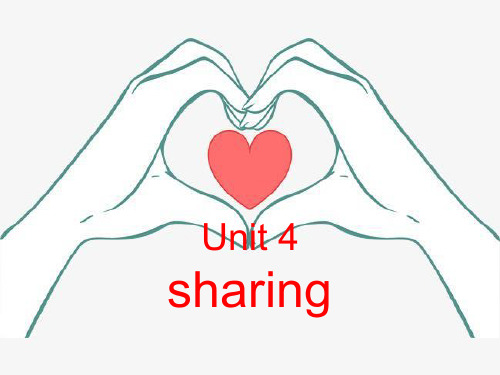
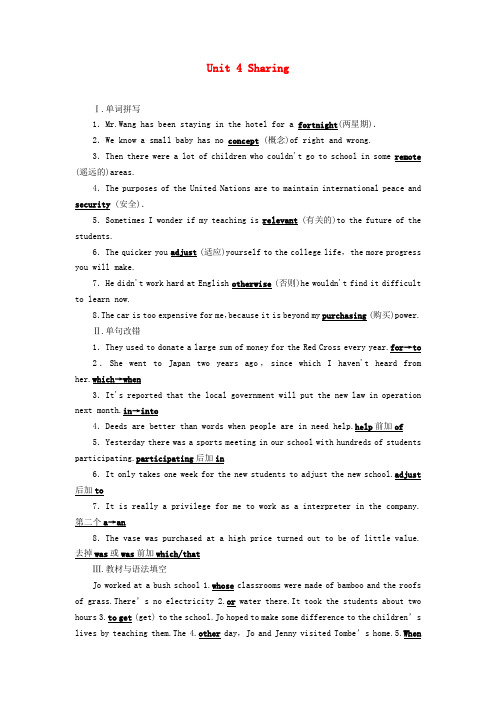
Unit 4 SharingⅠ.单词拼写1.Mr.Wang has been staying in the hotel for a fortnight(两星期).2.We know a small baby has no concept (概念)of right and wrong.3.Then there were a lot of children who couldn't go to school in some remote (遥远的)areas.4.The purposes of the United Nations are to maintain international peace and security (安全).5.Sometimes I wonder if my teaching is relevant (有关的)to the future of the students.6.The quicker you adjust(适应)yourself to the college life,the more progress you will make.7.He didn't work hard at English otherwise(否则)he wouldn't find it difficult to learn now.8.The car is too expensive for me,because it is beyond my purchasing(购买)power.Ⅱ.单句改错1.They used to donate a large sum of money for the Red Cross every year.for→to 2.She went to Japan two years ago,since which I haven't heard from her.which→when3.It's reported that the local government will put the new law in operation next month.in→into4.Deeds are better than words when people are in need help.help前加of5.Yesterday there was a sports meeting in our school with hundreds of students participating.participating后加in6.It only takes one week for the new students to adjust the new school.adjust 后加to7.It is really a privilege for me to work as a interpreter in the company.第二个a→an8.The vase was purchased at a high price turned out to be of little value.去掉was或was前加which/thatⅢ.教材与语法填空Jo worked at a bush school 1.whose classrooms were made of bamboo and the roofs of grass.There’s no electricity 2.or water there.It took the students about two hours 3.to get(get) to the school.Jo hoped to make some difference to the children’s lives by teaching them.The 4.other day,Jo and Jenny visited Tombe’s home.5.Whenthey arrived at the village ,Tombe’s mother who had been working in her garden,6.started (start) crying“ieee ieee”.Tombe’s father led them to his house,7.a low bamboo hut with grass 8.sticking (stick) out of the roof ,where he could only see a few tin plates and cups and a couple of 9.pots (pot).What they ate were sweet potatoes ,corn and greens.That night Jo and Jenny slept on a 10.newly (new) made platform.They left the village the next morning after many goodbyes and firm handshakes.Ⅳ.教材与短文改错Would you like to donate a unusual gift ?The gift you give is not something which your loved one keeps.It is a contribution in the lives of people who really needs it.Choose really useful gift for some of the world’s poorest and bring hope for a better future to a community in the need.This gift will train a whole village in new agriculture methods and provide seeds and simple agricultural equipments.Just 20% more produce will mean the difference between sick and health ,between families go hungry and families providing for themselves.答案:Would you like to donate a anunusual gift ?The gift you give is not something which that which your loved one keeps.It is a contribution in towards/tothe lives of people who really needs need it.Choose ∧areally useful gift for some of the world’s poorest and bring hope for a better future to a community in the need.This gift will train a whole village in new agriculture agriculturalmethods and provide seeds and simple agricultural equipments equipment.Just 20% more produce will mean the difference between sick sickness and health ,between families go goinghungry and families providing for themselves.Ⅴ.话题微写作1.李华作为一名志愿者教师,工作在一个偏远的山村。

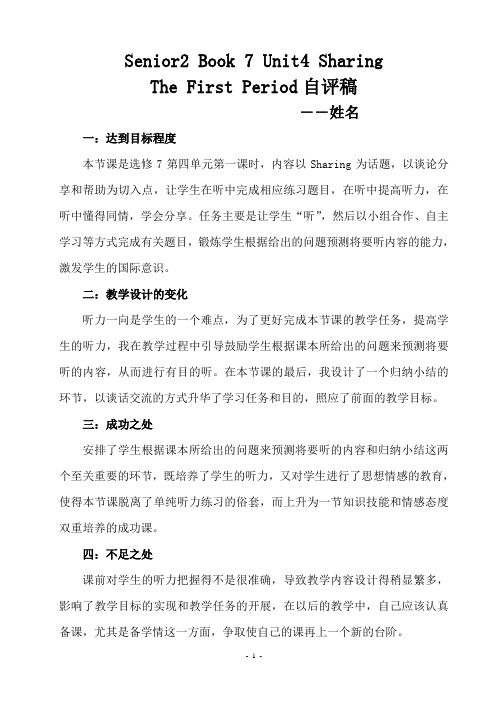
Senior2 Book 7 Unit4 Sharing
The First Period自评稿
――姓名
一:达到目标程度
本节课是选修7第四单元第一课时,内容以Sharing为话题,以谈论分享和帮助为切入点,让学生在听中完成相应练习题目,在听中提高听力,在听中懂得同情,学会分享。
任务主要是让学生“听”,然后以小组合作、自主学习等方式完成有关题目,锻炼学生根据给出的问题预测将要听内容的能力,激发学生的国际意识。
二:教学设计的变化
听力一向是学生的一个难点,为了更好完成本节课的教学任务,提高学生的听力,我在教学过程中引导鼓励学生根据课本所给出的问题来预测将要听的内容,从而进行有目的听。
在本节课的最后,我设计了一个归纳小结的环节,以谈话交流的方式升华了学习任务和目的,照应了前面的教学目标。
三:成功之处
安排了学生根据课本所给出的问题来预测将要听的内容和归纳小结这两个至关重要的环节,既培养了学生的听力,又对学生进行了思想情感的教育,使得本节课脱离了单纯听力练习的俗套,而上升为一节知识技能和情感态度双重培养的成功课。
四:不足之处
课前对学生的听力把握得不是很准确,导致教学内容设计得稍显繁多,影响了教学目标的实现和教学任务的开展,在以后的教学中,自己应该认真备课,尤其是备学情这一方面,争取使自己的课再上一个新的台阶。
- 1 -。
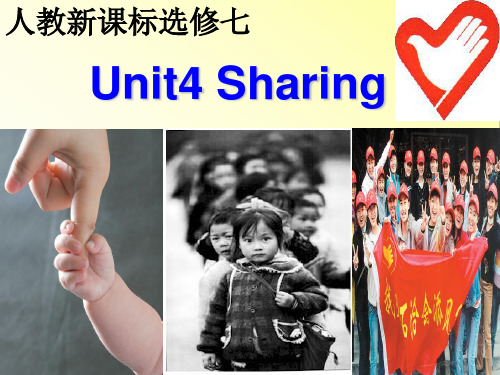

人教新课标选修7unit4Sharing全单元课件人教新课标选修7 Unit4 Sharing全单元课件一、确定文章类型本文是一篇说明文,旨在介绍人教版新课标选修7第四单元的主题——“分享”(Sharing)。
通过阐述分享的概念、重要性以及实践方法,本文旨在帮助学生理解分享的意义,培养他们的分享意识和能力。
二、编写引言在引言部分,我们首先引出本文的主题——分享。
通过提出一些与分享相关的问题,如“什么是分享?”、“分享对我们的生活有什么意义?”等,激发学生的好奇心,引导他们进入文章的主题。
三、围绕主题展开情节在引言之后,我们开始详细阐述分享的概念。
首先,我们需要让学生了解分享的本质——把属于自己的物品、知识、技能等与他人共享。
接着,我们通过分析分享在生活、学习、工作中的重要性,让学生认识到分享的价值。
在这一部分,我们可以引用一些生活中的例子,如分享食物、分享知识、分享技能等,帮助学生更好地理解分享的含义。
四、提供事实支撑为了使学生更好地理解分享的重要性,我们可以提供一些具体的事实和数据。
例如,我们可以引用一些研究结果表明,善于分享的人更容易获得他人的信任,也更容易建立良好的人际关系。
此外,我们还可以引用一些名人的事迹,如比尔·盖茨如何通过分享自己的知识和技能创立了微软公司,从而引导学生理解分享对于个人成长和事业发展的重要性。
五、分析论证在提供了事实和数据之后,我们需要对文章中的观点和论点进行分析和解释。
例如,我们可以解释为什么分享能够促进人际关系的建立和发展,为什么分享能够提高个人的认知能力和社交能力等。
通过深入分析,帮助学生理解分享的意义和价值。
六、总结归纳在文章结尾,我们对全篇文章进行总结归纳。
通过回顾分享的概念、重要性以及实践方法,让学生再次明确分享的意义。
我们也可以提出一些问题,如“我们应该如何培养分享意识和能力?”等,引导学生思考如何在日常生活中实践分享,从而巩固文章的主题。
总之,本文旨在通过详细的阐述和实例,让学生深入理解分享的含义和重要性,培养他们的分享意识和能力。
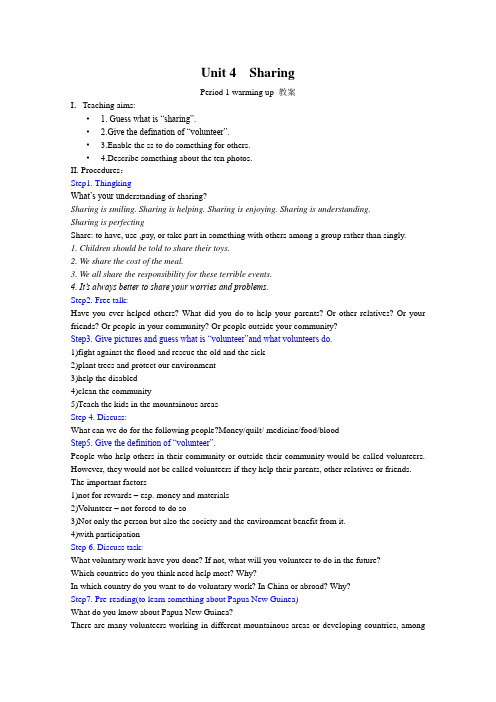
Unit 4 SharingPeriod 1 warming up 教案I.Teaching aims:• 1. Guess what is “sharing”.• 2.Give the defination of “volunteer”.• 3.Enable the ss to do something for others.• 4.Describe something about the ten photos.II.Procedures:Step1. ThingkingWhat’s your un derstanding of sharing?Sharing is smiling.Sharing is helping.Sharing is enjoying.Sharing is understanding.Sharing is perfectingShare: to have, use ,pay, or take part in something with others among a group rather than singly.1. Children should be told to share their toys.2. We share the cost of the meal.3. We all share the responsibility for these terrible events.4. It’s always better to share your worries and problems.Step2. Free talk:Have you ever helped others? What did you do to help your parents? Or other relatives? Or your friends? Or people in your community? Or people outside your community?Step3. Give pictures and guess what is “volunteer”and what volunteers do.1)fight against the flood and rescue the old and the sick2)plant trees and protect our environment3)help the disabled4)clean the community5)Teach the kids in the mountainous areasStep 4. Discuss:What can we do for the following people?Money/quilt/ medicine/food/bloodStep5. Give the definition of “volunteer”.People who help others in their community or outside their community would be called volunteers. However, they would not be called volunteers if they help their parents, other relatives or friends. The important factors1)not for rewards – esp. money and materials2)Volunteer – not forced to do so3)Not only the person but also the society and the environment benefit from it.4)with participationStep 6. Discuss task:What voluntary work have you done? If not, what will you volunteer to do in the future?Which countries do you think need help most? Why?In which country do you want to do voluntary work? In China or abroad? Why?Step7. Pre-reading(to learn something about Papua New Guinea)What do you know about Papua New Guinea?There are many volunteers working in different mountainous areas or developing countries, amongwhich Papua New Guinea(PNG) is one.Location: situated to the north of AustraliaPopulation: about 5.7 millionLanguage: English as the official languagePidgin English as the language for communicationEconomy: a poor country with most people living in tribal villages and depending on subsistence farming to make a living.Education: About 85% of children start school but only about 60% of these reach Year 5Step8. Give a brief description of the photos:Jo was a volunteer worked in Papua New Guinea (PNG) for two years.The following photos were taken by Jo in PNG. Look at the photos and answer the questions. Photos 1---31.What kind of student was in Jo’s class?Poorly dressed teenage boys2.Describe the classrooms.wooden pools, bamboo walls, grass roofs, grass on the floor, no glass in the windows3. What similarities and differences can you find between Jo’s and yours?Similarities: In a room with groupsdifferences: Jo’s classroom made of bamboo with grass roof and no windowsOurs made of bricks with glass windowsPhotos 4---101.What can you say about the village?The village is small. It’s by a river at the bottom of a valley. It has steep slopes all around it.2.What can you say about life in the village?The village huts are small. They have no widows and are made of wood, bamboo, and grass. The main crop is peanuts. The tool for planting is a digging stick. There is a bare-footed woman carrying a naked baby and a heavy bag on her shoulders.Step9. Homework:Ask Ss to work in groups and talk about the donations. If possible, encourage them to do for the poor children in poor areas in our country or in other countries.Unit4 SharingPeriod Two Reading教案I. Teaching aims:1. Enable t he Ss to learn more information about Jo’s job and the conditions of her teaching.2. Know more about the customs of local people.3. Discuss how you would do if you were a volunteer working in that area.4. Get more reading skills.II. Teaching procedure:Step 1: pre-reading:Give two questions:What was Jo’s job in PNG?What kind of students were in her class?Step2: Fast reading1. Jo is a young Australian women.2.Rosemary was dying to hear all about Jo’s life in Papua New Guinea.3. The boys walked a long way to get to the school.4. The boys and Jo didn’t have any textbooks.5. Jo became a lot more imaginative when teaching.6. The boys started jumping out the windows during a chemistry experiment.7. Jenny and Jo visited a village that was the home of one of the boys, Tombe.8. Kiak started crying “ieee ieee” to welcome them9. Mucap led us to a low bamboo hut.10. Kiak was going to share the platform with Jenny and Jo.11. Tombe’s family softly talked to each other in their language Jo didn’t understa nd.Step3. Do the judgement. (True or false according to the text)1. The classrooms are made of bricks and the roofs of grass.(F)2. It always takes the boys only a few minutes to get to the school.(F)3. Science is the most challenging subject for Jo.(T)4. When Jo and Jenny arrived at the village,they shook hands with all the villagers.(T)5. Tombe threw out the tin can because it’s very dirty.(F)Step4. Skimming and then answer the following questions:1.Why did Jo send Rosemary some photos?It’s difficult for Rosemary to imagine how life was hard / different in Jo’s ---2. Why was the high school called a bush school?The classroom were madeof bamboo and the roofs were made of grass.3. Were the boys and villagers friendly to Jo? How do you know?Lots of “good mornings” ; cry “ ieee ieee” ; shake hands4. Why was Science the most challenging subject for Jo?There was no equipment.5. Why did the boys start jumping out the window?The boy never came across something like bubbling mixture6. Why should it take Jo and Jenny two and a half hours to get to the village?They had to climb up a mountain to a ridge first and then down a steep path to the valley. Step5. Scanning and then anylize the structure of the text.Try to give the right order according to the contents of the text.2A .The condition of the school.1B An introduction.4C. The endingA. We had a meal and I saw a strange custom.B. The experiment frightened the boys.C. I am glad to receive Rosemary’s letter and I’ve included some photos.D. I left and I felt privileged.E. I saw the poor condition of the room.F. It’s a bush school and the students live far away.Step6. Detailed readingRead paragraph 1-3 and finish the questions1.Why does Jo call the high school a “bush school”2.Were the boys friendly to Jo? How do you know?3.How long does it take the students to go to school?4.Why was science the most challenging subject for Jo?5.Why did the boys start jumping out of the windows?6.Why does Jo wonder how relevant chemistry is to the kids?Read paragraph 1-3 and finish the questions1.Why does Jo call the high school a “bush school”Because the classrooms are made from bamboo and the roofs from grass.2.Were the boys friendly to Jo? How do you know?There are a lot of “good mornings” for Jo from the boys.3.How long does it take the students to go to school?Sometimes up to 2 hours4.Why was science the most challenging subject for Jo?There was no equipment.5.Why did the boys start jumping out of the windows?The boys never came across anything like the bubbling mixture.6.Why does Jo wonder how relevant chemistry is to the kids?Because most of the boys will go back to their villages after year 8 and she thinks chemistry may make little difference to the kids’ life.Step7. ComprehendingWhat have you learned about the customs and lives of the people in Tombe’s village? Read Jo’sStep8. Post-readingGuess the reasons for the facts according to the Jo’s letter.1. The boys jumped out of the windows in the science lesson.In the science lesson the boys were frightened by what they saw --- the mixture was bubbling over everywhere, thinking that something terrible had happened, so they jumped out of the windows to escape from danger.2. Jo wondered how relevant chemistry was to the boys.Because most of the boys will go back to their village after studying in the school, and their knowledge of chemistry will prove useless, so Jo wondered how relevant chemistry was to the boys.3. Tombe’s mother cried “ieee ieee” when he say Jo.I think it’s a kind of greeting in their village. And I’m sure all the family members will be happy and excited to have visitors like Jenny and Jo.4. There were no windows in Mukap’s hut.There were no windows in Mukap’s hut. Perhaps in this way can prevent flies, mosquitoes and other insects from coming in. Of course, if there were glass, they could both have a big window, and at the same time, they can keep all the insects from entering.5. The tin can was standing upside down on the grill.The tin can was standing upside down on the grill in order to get the leftover dry up quickly.Step9. Fill in the chart:What do you think are the positive and negative things about living in a village in Papua NewStep10. Discussion in groups:think you would have felt? Give reasons.First I think it was such a long distance from the school to Tombe’s home. Second, the family members and the villagers showed great hospitality to us, which impressed us very deeply. Third, we got the chance to know the villager’s simple life. Therefore, we were determined to go on with volunteer work to help the boys get enough education3.Why do you think Jo became a volunteer in PNG? Give as many possible reasons as you can. Would you like to work as a volunteer in a poor area?Give reasons.Useful phrases: be willing to; do one’s bit to do; be eager to do; be full of ; work hard and endure hardship…Key words: kind-hearted; helpful; strong-mindedA sample of the discussions:A: I think, first of all, Jo was a kind-hearted woman, who is willing to help others. Second, she knew enough about the poor conditions in PNG and thought that she could help teach in the schools. IfI am given the chance, I will do whatever I can to help.B: In my opinion, Jo must have worked as a teacher in Australia, and she applied to become a volunteer abroad, and then she was sent to PNG as a volunteer.C: Maybe she thinks that education is the key to solving all the problems in PNG, so she, as a teacher, goes to PNG to help.D: Perhaps she likes traveling abroad, helping the poor wherever she goes.E: I don’t agree with you. You know, she stayed there for two years. A traveler once d id that. She was willing to help the poor children in PNG to be educated. She was doing her bit to change thepoor’s state of living and education. Ifeveryone in the rich countries should do like her, all the problems stemming from poverty could be solved easily.F: I would like to say something about the second topic. I think I will be a volunteer in a poor area. Whenever I saw the poor living state of the poor in the western areas and mountainous areas, I was eager to do something for them. All are create d equal. But they can’t get what we can enjoy. What a pity! If possible, I will try to helpStep11.Homework:Surf the Internet to find some information about the volunteers working in poor areas.Unit 1 Living WellPeriod 3 Learning about language 教案I.Teaching aims:1. Guess words according to the word meaning.2. Fill in the blanks of a given passage.3. Learn important words , phrases and some important sentence stuctures.II.ProceduresStep 1 Do exercise for Ex.1 on page32Find words in the unit that have the following meanings.1.___to change slightly to make something work better (adjust)2 ____ a metal shelf for cooking meat, toasting bread, etc (grill)3 ____ connected with what is being done or discussed (relevant)4 ____ an idea(concept)5 ____ an honour(privilege)6 _____something that has been organized(arrangement )7. ____written work in an office, such as writingreports or letters(paperwork)8. ____ to breathe air into your nose noisily(sniff)Step2 Complete the paragraph with words or phrases below in their proper form.Sharon looked at herself in the mirror and sighed. She had posted the airmail letter to Tim last week but had had no reply.She smoothed her hair down with a wet comb, wiped her muddy shoes, and thought about the three months she had known her. He was the nicest boy she had ever met. Otherwise she would not have fallen in love with him. She still remembered that he adjusted quickly when he heard she came from a remote village. At first she had heard from him every week but now she had not heard for a fortnight. Why? She had decided to find out. She walked down the platform to catch the train to New York feeling both excited. and nervous. She was dying to see him again but what if he didn't want to see her?Step3 Look at these definitions and make suitable phrasal verbs with the words in the right box. Then make a dialogue using each one.out; off; up; from; for; up; down; of; to1( dry out) to become complete dry.2(dry up) to become dry on the surface.3(dry off) to come to an end4(hear out) to listen to somebody till the end5(hear from) to receive a letter or a phone call from someone6(hear of )to have knowledge of sb/ sth7(be dying to ) to want to do something very much8(die out ) to disappear or stop existing completely9(die down ) to graduallyy get quieterStep4 Learn important words , phrases and some important sentence stuctures.1.It was wonderful to hear from you.hear from sb. = receive a letter from sb. 收到某人的信hear of ,hear from & hear aboutHave you heard from Charles recently?I never heard of a man with the name Tom.I have heard much about Beckham.2. I know you’re dying to hear all about my life here.be dying to do / for sth. 渴望做某事;迫切想要She is dying to go abroad.I am dying for a glass of water.“渴望”的类似说法be thirty for sth./ desire to do sth./ have a strong desire for sth./ long to do for sth.3. Many of them have walked a long way, sometimes up to two hours, to get to the school.up to = as many as/ as much asHe can earn up to $50,000 a year.up to 还可以表示(1) up until 一直She lived at home right up to / until she got married.(2) good enough for sth. 胜任I am not sure if she is really up to that job.(3)由……负责It’s up to her to decide whether or not to go on the course4. The boys who had never come across anything like this before started…..come across 偶然遇见/发现I came across some interesting books in the room.I came across an old friend I hadn’t seen for years.come about 发生This situation should never have come about.come along 进展How is your work come along?5. imaginative adj.富有想象力的,爱想象的an imaginative child/writerimaginary adj.想象中的,假想的imagine v.设想imaginable adj.可想象的image n.雕像,肖像imagination n.想象力a man of rich imagination词语辨析:Imaginative: showing new and exciting ideas富于想象力的;创新的We need imaginative people to put new energy into the team.Imaginary: existing only in your mind or imagination想象中的The story is wholly imaginary.imaginable:(与形容词最高级或与all,every连用,表示强调或概括)想象得到的;可想象的The house has the most beautiful views imaginable.6.Sometimes l wonder how relevant chemistry is to these students,most of whom will be going back to their villages after Year 8 anyway1)relevant 有关的;有实际重要性的(be relevant to sth./sb.)His age is not relevant to whether he is a good teacher.他的年龄与他是否是一位好老师无关。

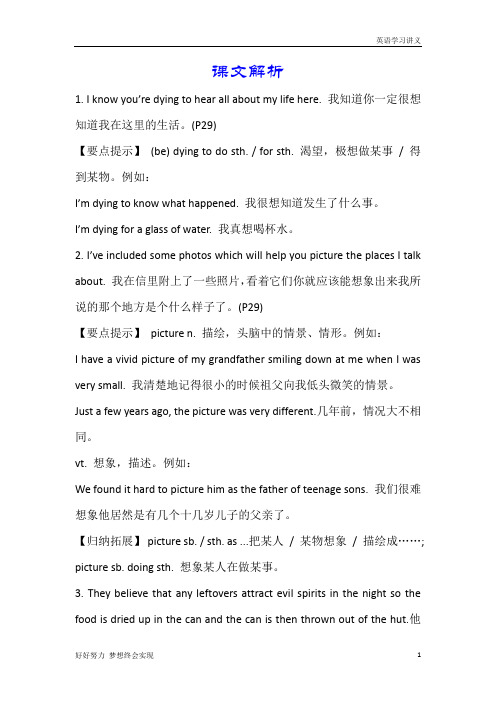
课文解析1. I know you’re dying to hear all about my life here. 我知道你一定很想知道我在这里的生活。
(P29)【要点提示】(be) dying to do sth. / for sth. 渴望,极想做某事/ 得到某物。
例如:I’m dying to know what happened. 我很想知道发生了什么事。
I’m dying for a glass of water. 我真想喝杯水。
2. I’ve included some photos which will help you picture the places I talk about. 我在信里附上了一些照片,看着它们你就应该能想象出来我所说的那个地方是个什么样子了。
(P29)【要点提示】picture n. 描绘,头脑中的情景、情形。
例如:I have a vivid picture of my grandfather smiling down at me when I was very small. 我清楚地记得很小的时候祖父向我低头微笑的情景。
Just a few years ago, the picture was very different.几年前,情况大不相同。
vt. 想象,描述。
例如:We found it hard to picture him as the father of teenage sons. 我们很难想象他居然是有几个十几岁儿子的父亲了。
【归纳拓展】picture sb. / sth. as ...把某人/ 某物想象/ 描绘成……; picture sb. doing sth. 想象某人在做某事。
3. They believe that any leftovers attract evil spirits in the night so the food is dried up in the can and the can is then thrown out of the hut.他们认为剩菜剩饭在晚上会吸引邪灵,所以把食物在罐子里弄干,然后把罐子扔到屋外。
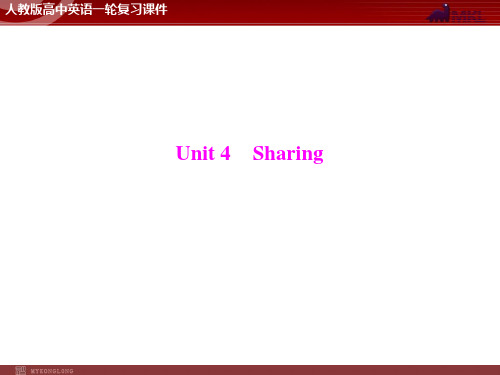
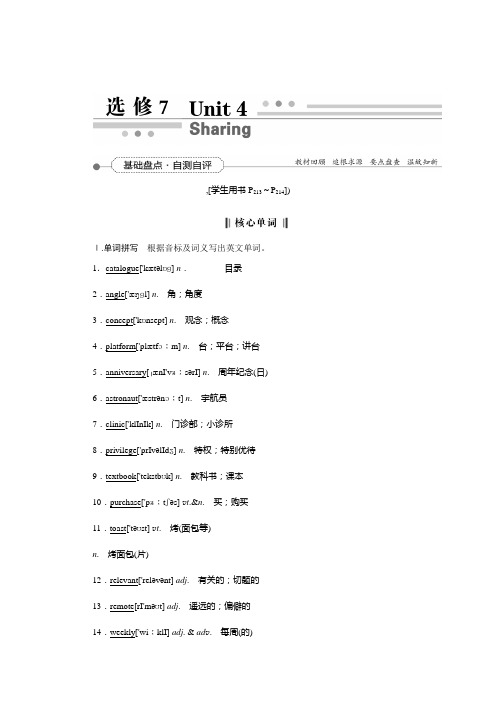
,[学生用书P213~P214])Ⅰ.单词拼写根据音标及词义写出英文单词。
1.catalogue['kætəlɒɡ] n.目录2.angle['æŋɡl] n. 角;角度3.concept['kɒnsept] n. 观念;概念4.platform['plætfɔːm] n. 台;平台;讲台5.anniversary[ˌænI'vɜːsərI] n. 周年纪念(日) 6.astronaut['æstrənɔːt] n. 宇航员7.clinic['klInIk] n. 门诊部;小诊所8.privilege['prIvəlIdʒ] n. 特权;特别优待9.textbook['tekstbʊk] n. 教科书;课本10.purchase['pɜːtʃəs] v t.&n. 买;购买11.toast['təʊst] v t. 烤(面包等)n. 烤面包(片)12.relevant['reləvənt] adj. 有关的;切题的13.remote[rI'məʊt] adj. 遥远的;偏僻的14.weekly['wiːklI] adj. & ad v. 每周(的)15.otherwise['ʌðəwaIz] conj. 否则;不然ad v. 用别的方法16.donate[dəʊ'neIt] v t. 捐赠Ⅱ.单词拓展写出下列单词及其派生词。
1.mud n.泥;淤泥;泥浆muddy adj. 泥泞的;模糊的;混乱的2.participate v i. 参与;参加participation n. 参与;参加participant n. 参加者;参与者3.distribute v t. 分配;分发distribution n. 分配;分发;分布状态distributor n. 发行人;经销商;分销商4.secure v t. 保护adj. 安全的security n. 安全;保护;保障5.voluntary adj. 自愿的;无偿的volunteer n. 志愿者1.hear_from接到……的信2.(be)_dying_to 极想;渴望3.the_other_day 不久前的一天4.be_relevant_to... 和……有关5.participate_in 参与……;参加……6.dry_out (使浸水等之物)完全变干;干透7.dry_up (指河流、井等)干涸8.in_need 在困难中;在危急中9.get_through 完成;穿过10.stick_out 伸出11.make_a_difference 起作用语境取词选用上面的单词或短语填空Many people participated(参加)in this activity to help the peoplein_need(在困难中),some donating(捐助)money,some serving asvolunteers(志愿者).Many children in remote(偏僻的)areas are_dying_to(渴望)get moreknowledge or something relevant(与……相关的)to the outside world,soyour help to them can make_a_difference(起作用).1.doubt whether...怀疑是否……To be honest,I doubt whether I’m making any difference to these boys’ lives at all.[仿写]我怀疑他们两天内能否完成这项艰巨的任务。
1.remote(adj.)遥远的;偏僻的2.otherwise(conj.) 否则;不然(ad v.) 用别的方法;其他方面3.purchase(v t.)&(n.) 买;购买4.fortnight(n.) 两星期5.concept(n.) 观念;概念6.toast(v t.) 烤(面包等); 敬酒(n.) 烤面包(片); 干杯7.anniversary(n.) 周年纪念(日)8.click(v i.)&(v t.) (使)发出咔嗒声(n.) 咔嗒声9.relevant(adj.) 有关的;切题的10.privilege(n.) 特权;特别优待(v t.) 给予……特权11.adjust(v i.)&(v t.)调整;(使)适合→adjustable(adj.)可调整的→adjustment(n.)调整,调节,适应12.participate(v i.)参与;参加→participation(n.)参加,参与→participant(n.)参与者13.operate(v i.)工作;运转(v t.)操作→operation(n.)手术,运转→operator(n.)操作人员14.donate(v t.)捐赠→donation(n.)捐赠→donator(n.)捐赠者15.voluntary(adj.)自愿的;志愿的;无偿的→volunteer(n.)自愿者;志愿者(v i.)自愿做……16.distribute(v t.)分配;分发→distribution(n.)分配;分发;分布状态17.security(n.)安全;保护;保障→secure(v t.)使安全18.mud(n.)泥;淤泥;泥浆→muddy(adj.)泥泞的;泥土般的;模糊的;混乱的[用所给词的适当形式填空]1.We donate to the school fund every year.The donation is given to those who do best in exams.(donate)2.You can adjust the desks and chairs to the height of the students.The adjustment is not difficult to make.(adjust)3.The volunteer said that he was willing to participate in the voluntary activity.(volunteer) 4.They encouraged the participants to participate in the singing performance after the contest and their participationgave the students much delight.(participate)5.His property was distributed among his sons.But unexpectedly,they had a conflict about the distribution.(distribute)1.hear_from接到……的信2.(be)_dying_to 极想;渴望3.the_other_day 不久前的一天4.be_relevant_to... 和……有关5.participate_in 参与……;参加……6.dry_out (使浸水等之物)完全变干;干透7.dry_up (指河流、井等)干涸8.in_need 在困难中;在危急中9.get_through 完成;穿过10.stick_out 伸出11.make_a_difference 起作用[选用上面的短语填空]Many children in remote areas 1.are_dying_to_get more knowledge or something 2.relevant_to the outside world,so your help to them can 3.make_a_difference.As a result, a great many people4.participated_in this activity to help the people5.in_need,some donating money,some serving as volunteers.1.doubt whether...怀疑是否……To be honest,I doubt whether I’m making any difference to these boys’ lives at all.【仿写】我怀疑他们两天内能否完成这项艰巨的任务。
I doubt_whether they will finish the hard task in two days.2.助动词do/does/did+动词原形构成强调句But last weekend another teacher,Jenny,and I did visit a village which is the home of one of the boys,Tombe.【仿写】你昨天没在家,但他确实来过这儿了。
You were not at home,but he did_come here yesterday.3.from where引导定语从句We walked for two and a half hours to get there—first up a mountain to a ridge from where we had fantastic views and then down a steep path to the valley below.【仿写】我们爬到山顶,在那儿我们可以一览整个城市的风景。
We went up to the top of the hill,from_where_we_had_a_good_view_of_the_whole_city. 4.not...but...不是……而是……The gift you give is not something your loved one keeps but a voluntary contribution towards the lives of people who really need it.【仿写】是你现在做的事情而不是你说的话对你今后的生活有重大影响。
It is not what you say today but_what_you_do today that makes a great difference to your life tomorrow.阅读下面课文缩写材料,在空白处填入适当的内容(1 个单词)或括号内单词的正确形式。
Jo worked at a bush school 1.whose classrooms were made of bamboo and the roofs of grass.There’s no electricity 2.or water there.It took the students about two hours 3.to_get (get) the school.Jo hoped to make some difference 4.to the children’s lives by teaching them.The other day,Jo visited Tombe’s home.5.When they arrived at the village,Tombe’s mother who had been working in her garden,6.started (start) crying “ieee ieee”.Tombe’s father led them to his house,7.a low bamboo hut with grass 8.sticking(stick) out of the roof. The only possessions he could see were one broom, a few tin plates and cups and a couple of 9.jars(jar).What they ate was sweet potato, corn and greens. That night Jo and Jenny slept on a 10.newly(new) made platform.They left the village the next morning after many goodbyes and firm handshakes.限制性定语从句[单句语法填空]1.Such things as you described in the report seldom happen now.2.—Where did you meet Mr. Smith from the US yesterday?—It was in that market where we often buy things.3.Would you be kind enough to help the boy for whose Chinese is really hard to learn?4.This is the best book that I have been looking for all this year.5.The time is not far away when modern communications will become widespread in China’s vast countryside.1. adjust vi.&vt.调整;(使)适合(教材P30)The hut was dark inside so it took time for our eyes to adjust.房子里是黑暗的,因此这需要一点时间让我们的眼睛适应。
(1)adjust sth.to sth.调整……以适应……adjust (oneself) to 使(自己)适应于……(2)adjustment n. 调整;调节;适应make an adjustment 作出调整(3)adjustable adj. 可调整的;可调节的①He adjusted his life so that he could adjust himself to the new environment.他调整了自己的生活以便能适应新环境。